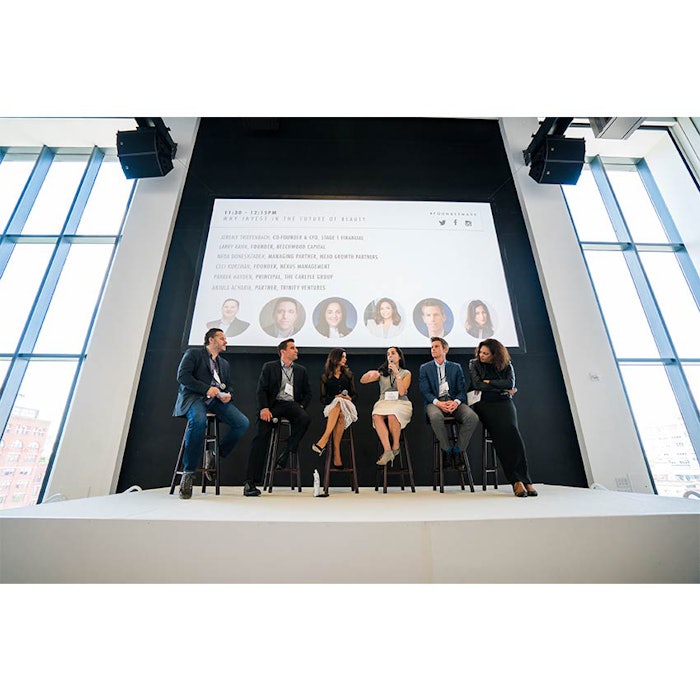
FounderMade Beauty recently presented a look at the world of independent beauty, including founders, investors, the latest startups and retail leaders. Like FounderMade's Wellness Summit, the event pointed to the key trends shaping the industry. This story is part of a multi-part feature covering the key topics from the conference.
During a FounderMade panel, an audience member from Goldman Sachs noted that they were seeking investment opportunities in beauty but were experiencing trouble with quantifying the strength of brands’ performance. The panel of investors had some insights for the attendee and brands.
Larry Kahn, founder of Beechwood Capital noted that beauty is attractive to investors because it’s a replenishment business with light products. In addition, it’s easy for small players to get into the business, which offers high margins. While digital-first is the name of the game, Kahn pointed out that eventually growth will push most brands into the omnichannel.
Parker Hayden, principal at The Carlyle Group, added that legacy companies can’t replicate what small companies are doing. Multinational brands conduct traditional branding and take as much as three years to get products to market. In contrast, startups get products to market in six months or less, spend very little (if anything) on marketing and build their businesses via social media engagement. It’s this gap in expertise and nimbleness that leads big brands to buy smaller upstarts.
If a brand is generating $150 million in revenue, has a strong founder story and robust social media following, it’s highly likely to be acquired.
Unfortunately, Hayden said, legacy brands too often make changes to their small acquisitions, undoing some of the inherent advantages of their assets.
If a brand is generating $150 million in revenue, has a strong founder story and robust social media following, it’s highly likely to be acquired, said Anjula Acharia, cofounder of Trinity Ventures. In this age of digital-first direct-to consumer beauty startups, some brands are able to quickly generate more than $40 million in sales via Facebook alone.
In 2017, brands would be crazy to start a business that wasn’t direct-to-consumer.
Hayden said that, in 2017, brands would be crazy to start a business that wasn’t direct-to-consumer. This new model, he said, is more profitable than conventional brick-and-mortar strategies; it also makes it easier to reach consumers. However, he warned, brands must build followings that are authentic and noted that best founders talk about how smart their customers are. Acharia added that brands cannot be in a monologue with their consumer—it has to be a dialogue. Those that own their distribution and the social conversation will be the best positioned for growth, investment and acquisition.
Brands must show that they own their space.
Neda Doneshzadeh, partner at L Catterton, which just took a 35.8% stake in Il Makiage, said that investors are looking for unequivocal consumer adoption—proof that your brand has a passionate and loyal consumer base. Even if a brand has tight distribution—a handful of Sephora stores, a QVC exclusive or limited geographical reach, for instance—brands must show that they own their space. Doneshzadeh concluded that brands should spend every dollar building that adoption.
In assessing brands, Hayden said that he examines the target market, surveys a small sample of consumers to determine which attributes are most important to them, and tests out competing brands to figure out the functional and emotional performance available. This type of assessment can happen in the early stages of a brand.
There is nothing better than an evangelical, rabid founder.
For example, Doneshzadeh said that she’s held small focus groups to assess prospective brands that didn’t yet have significant sales. Jeremy Triefenbach, co-founder and CFO of Stage 1 Financial, said that his firm works with companies pre-concept. In those situations, he said it is all about having the fundamentals of the deliverables in place. After all, he said, investment requires that founders get their investors to buy into the founder and their dream.
Ceci Kurzman, founder of Nexus Management, said that there is nothing better than an evangelical, rabid founder. She added that a successful brand is one that can scale beyond its hero product to avoid plateauing.
Kahn said that he looks at a brand’s social media traction, velocity and whether it has assembled a team that’s ready to be built out. He went on to encourage the brands in the room to ensure that they raise enough capital to accomplish growth goals. This, he added, is where brands often underestimate what is needed.

![Curious about the latest trends in Beauty and Personal Care innovation? [download free report]](https://native-x.imgix.net/allured/65fde687b40d3e0001e2ce0d/_Thumbnail%20Image%201-19-24.jpg?crop=focalpoint&fit=crop&fp-x=0.5&fp-y=0.5&h=191&w=340&auto=format%2Ccompress&q=70)








